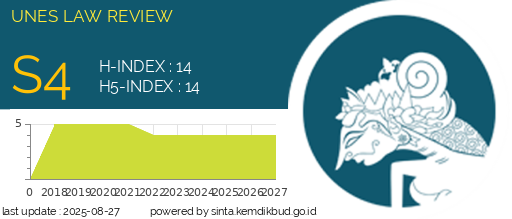EX ANTE REVIEW MELALUI RISET ETNOGRAFI VIRTUAL DALAM PERSPEKTIF LEGISPRUDENSI DI MASA PANDEMI COVID-19
DOI:
https://doi.org/10.31933/unesrev.v4i4.274Keywords:
Virtual Ethnography, Legal Drafting, LegislationAbstract
Virtual ethnography is a research method that examines social phenomena based on the dynamics of netizens observed using certain parameters according to the needs of researchers. In the context of drafting laws, virtual ethnography allows legal researchers to observe, assess, and conclude various phenomena that arise in relation to the public's response to a draft law. Ex ante review is an elaboration of the virtual dynamics of society which, when associated with a legislative perspective, can be an important consideration in preventing the birth of bad legislation due to the dominance of the role of the People's Representative Council who fights for forms of legislation on behalf of certain political sects. The increasing number of active internet users, especially those who access social media, allows ethnographic research methodologies to virtually become an important research object for further study.
Downloads
References
Alia Ariesanti, 2021, Realitas Masyarakat Dalam Potret Netnografi, Surabaya, hlm. 1.
Victor Imanuel W. Nalle, Konstruksi Model Pengujian Ex Ante Terhadap Rancangan Undang-Undang di Indonesia, Konstitusi Vol. 10 No. 3, September 2013, hlm. 444.
Putera Astomo, Pembentukan Undang-Undang dalam Rangka Pembaharuan Hukum Nasional di Era Demokrasi, Konstitusi Vol. 11 No. 3, September 2014, hlm. 578-579.
Zainal Abidin Ahmad & Rachma Ida, Etnografi Virtual Sebagai Teknik Pengumpulan Data dan Metode Penelitian, The Journal of Society & Media, Vol. 2 No. 1, 2018, hlm. 130-131.
Sulistyowati Irianto, Praktik Penelitian Hukum: Perspektif Sosiolegal, tidak dipublikasikan, hlm. 4.
Desy Wulandari, Ex Ante Review dalam Mewujudkan Konstitualitas Peraturan Perundang-Undangan di Indonesia, Indonesian State Law Review, Vol. 1 No. 1, Oktober 2018, hlm. 49.
Undang-Undang Republik Indonesia Nomor 12 Tahun 2011 Tentang Pembentukan Peraturan Perundang-Undangan.
Downloads
Published
How to Cite
Issue
Section
License
Hak cipta :
Penulis yang mempublikasikan manuskripnya di jurnal ini menyetujui ketentuan berikut:
- Hak cipta pada setiap artikel adalah milik penulis.
- Penulis mengakui bahwa UNES Law Review berhak menjadi yang pertama menerbitkan dengan lisensi Creative Commons Attribution 4.0 International (Attribution 4.0 International CC BY 4.0) .
- Penulis dapat mengirimkan artikel secara terpisah, mengatur distribusi non-eksklusif manuskrip yang telah diterbitkan dalam jurnal ini ke versi lain (misalnya, dikirim ke repositori institusi penulis, publikasi ke dalam buku, dll.), dengan mengakui bahwa manuskrip telah diterbitkan pertama kali di Jurnal UNES Law Review.



















